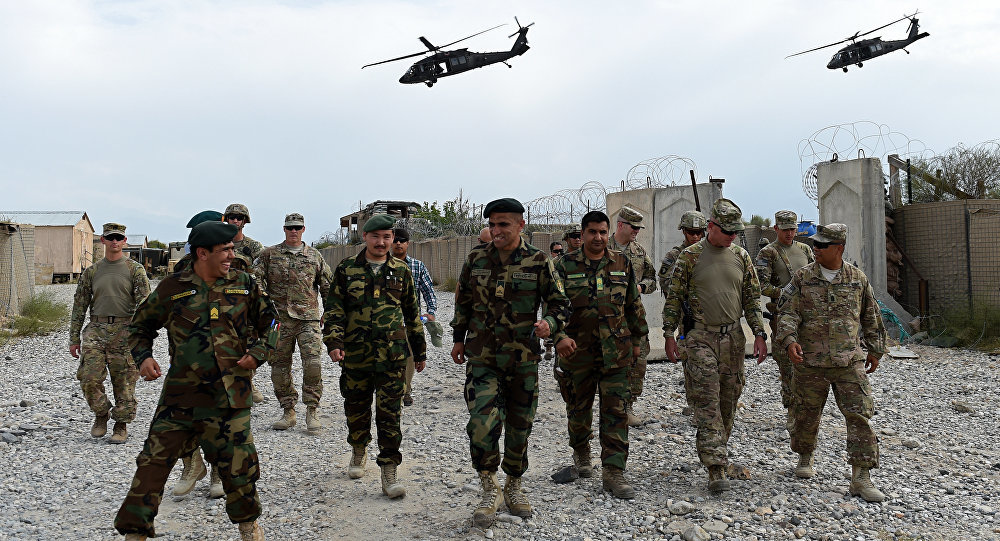American experiment in Afghanistan proves a disaster

Afghan security forces and Taliban fighters were seen embracing each other with warmth, camaraderie and sheer joy in different cities of Afghanistan after the Taliban agreed to unprecedented three-day Eid ceasefire with the Afghan government.
The surprise announcement was widely welcomed by war-weary Afghans for whom Eid had never before been about celebrations or festivities.
It was the first time since 2001 that the insurgent group declared a ceasefire, which provided a glimmer of hope in the times of despair and darkness. The joy, however, was short-lived.
Although the Afghan government extended the unilateral ceasefire by 10 days, the Taliban turned down the offer to extend it beyond three days. Those who were seen hugging each other three days ago went back to the frontlines of war, to plan and execute more attacks against each other.
At least 16 Afghan policemen and two civilians were killed in western Badghis province after the three-day truce ended at the weekend. The feasts, hugs and selfies were soon replaced with tears, grief and mourning within just three days, underscoring fragility of peace and futility of such unilateral exercises.
According to a United Nations report, a total of 10,453 civilian casualties were documented in Afghanistan in 2017, mostly caused by suicide bombings, IED attacks and ground engagements. In the first quarter of 2018, armed conflict in Afghanistan resulted in further 2258 civilian casualties, according to the world body. The toll keeps mounting every day.
Afghanistan’s embattled president Ashraf Ghani, who finds himself in an increasingly precarious situation with sharp escalation in terror attacks across Afghanistan, has been frantically wooing the insurgent group with an offer of ‘unconditional talks’, but with little success. Ghani, who became the head of a coalition government in Kabul through a US-brokered deal in 2014, has come under blistering criticism for being a weak and incapable leader.
But, Ghani administration alone cannot be blamed for the sea of problems Afghanistan finds itself in. The international community, which came to Afghanistan after the fall of the Taliban in 2001, has failed to deliver on all its promises. The American ‘experiment’ has utterly failed in the war-torn country. Even the most hawkish Americans have conceded defeat in the country, terming it embarrassing.
Almost 17 years after occupying the country and launching the so-called ‘war against terrorism’, Americans are yet to figure out the way to bring peace to the country. Their counter-terrorism operations have failed, their counter-narcotics campaign has proved a disaster, their ‘reconstruction efforts’ have only brought more destruction, they have failed to dismantle terror infrastructure across the border, and their presence has emboldened insurgents to launch indiscriminate attacks across the country, resulting in civilian casualties.
And, on many occasions, their drone strikes have destroyed schools and hospitals and left trail of death and destruction. Much to the chagrin of Afghan people, every time they have managed to get away with such horrendous crimes, with the blessings of Kabul government.
Today, Afghanistan has become America’s longest war and the biggest disaster. Although Trump has ordered the deployment of more U.S. troops to the country, the continued stalemate is the only likely outcome. What more than a trillion dollars and 100,000 troops could not achieve for America in 17 years, the madman in the White House thinks he can achieve that with fewer resources in his time. That is how far-sighted and visionary American presidents are. Their ‘experiments’ have wreaked havoc in many countries, including Afghanistan.
To hide America’s failures in Afghanistan, the megalomaniac American president in his hyperbolic New Year tweet decided to put the blame on Afghanistan’s neighbor – Pakistan. No, the U.S. President is not concerned over ‘militant sanctuaries’ on the soil of Pakistan. As some Pakistani politicians and experts rightly said, he is simply looking for a scapegoat for America’s fiascos in Afghanistan. But, history will not forgive him or his predecessors.
Leave a Comment